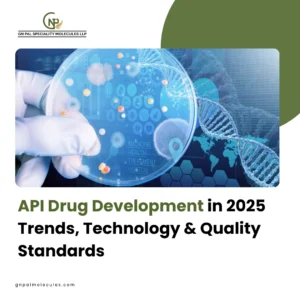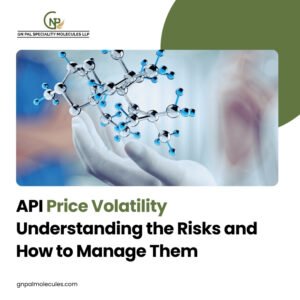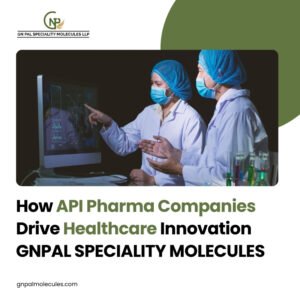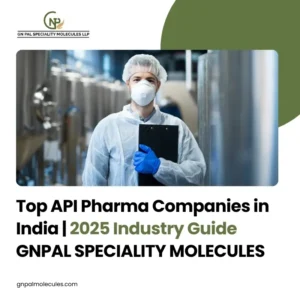The Progress in API Drug Development
The core of all medications in the pharmaceutical industry is made up of Activated Pharmaceutical Ingredients (APIs). Unlike inactive ingredients, these substances are the source of the therapeutic effects that aid in treating various illnesses. Over the past few decades, the development of API drugs has experienced significant changes, primarily due to regulatory shifts, technological advancements, and the globalization of pharmaceutical manufacturing.
Modern drug formulations are becoming increasingly intricate, making API manufacturers a key player in shaping the future of medicine. GNPal Molecules LLP, a trusted supplier, is at the forefront of providing pharmaceutical active ingredients that meet rigorous regulatory and performance standards.
Hence, let’s explore the evolution of API development and examine the significant roles played by players in the current pharmaceutical industry, particularly those of GNPal Molecules.
Understanding Activated Pharmaceutical Ingredients
What Are APIs?
Activated Pharmaceutical Ingredients are the biologically active components of drug products. They are responsible for achieving targeted therapeutic effects. For example, in the case of ibuprofen, the API helps reduce inflammation and pain.
APIs vs Excipients
APIs are responsible for the drug’s healing action, while excipients are inactive components that aid in drug delivery, stability, and shelf life. While both are essential, only APIs determine the drug’s therapeutic effectiveness.
Historical Evolution of API Manufacturing
From In-House to Outsourced Production
Pharmaceutical companies initially manufactured APIs in-house. However, growing complexity, tighter regulations, and cost pressures led to a shift toward outsourcing API production to specialized firms.
Globalization of API Manufacturing
The availability of low-cost production in countries like India and China accelerated the shift of API manufacturing to these regions, making them global hubs.
The Importance of APIs in the Pharma Industry
- High-purity APIs ensure therapeutic efficacy.
- Strict quality control in APIs enhances patient safety and minimizes side effects.
- Regulatory bodies require consistent and high-quality APIs for drug approvals.
Regulatory Landscape for API Manufacturing
FDA, EMA, and ICH Compliance
Regulatory authorities such as the FDA (US), EMA (Europe), and ICH mandate adherence to Good Manufacturing Practices (GMP) and detailed documentation to ensure safety and quality.
Global Harmonization
By harmonizing standards across borders, pharmaceutical companies can avoid duplication and expand their API use to multiple markets confidently.
Technological Advancements in API Production
Continuous Manufacturing
This method provides improved consistency and cost-efficiency compared to traditional batch processing.
Advanced Analytics and Automation
With machine learning and real-time monitoring, manufacturers can detect errors early and optimize API production for better outcomes.
Green Chemistry in API Manufacturing
Green chemistry is gaining traction in API production with practices such as:
- Use of renewable materials
- Reduction of waste
- Use of environmentally safer solvents
These methods reduce environmental impact and appeal to sustainability-conscious pharmaceutical companies.
The Future of API Synthesis and Biocatalysis
Biocatalysis, involving microbial systems or enzymes, offers a sustainable and efficient way to produce APIs. Benefits include:
- Mild operating conditions
- Greater product selectivity
- Reduced need for toxic chemicals
Outsourcing API Manufacturing
Pharma companies prefer outsourcing API manufacturing due to:
- Cost Reduction: Avoid investment in expensive infrastructure.
- Expertise Access: Work with professionals who specialize in API synthesis.
- Flexibility: Easily scale operations according to market demand.
The Role of APIs in R&D and Clinical Trials
Early-Stage Development
In R&D, API suppliers like GNPal Molecules collaborate on synthesis optimization and analytical development.
Clinical Trials
APIs used in trials must meet strict GMP standards and maintain quality and purity.
Scale-Up and Commercialization Challenges
Transitioning from lab to commercial scale involves:
- Process reproducibility
- Cost management
- Global supply chain logistics
GNPal Molecules’s strong quality assurance and dependable logistics help navigate these challenges.
Personalized Medicine Trends and Custom APIs
Custom APIs are vital for precision medicine. Manufacturers must be nimble and capable of creating small, personalized batches frequently.
Ensuring API Quality and Integrity
Active Pharmaceutical Ingredients (APIs) are a crucial aspect of the pharmaceutical industry, with no regard for their integrity or quality. Since APIs are the therapeutic basis for all drugs, even slight changes in their composition, purity, or strength can have serious consequences, including reduced effectiveness and potentially life-threatening side effects. Regulatory bodies worldwide have established rigorous procedures to ensure that API batches meet specific safety, purity, and performance criteria.
Importance of Quality in APIs
High-quality APIs are essential for:
- A drug’s therapeutic efficacy is dependent on the API’S chemical stability, biological activity, and precision in its formulation.
- Patient safety can be impacted by the unexpected negative effects of impure APIs. By ensuring quality, toxicity and allergic reactions are minimized.
- To be considered for approval, any drug must meet and comply with international standards such as those established by FDA, EMA, WHO, and ICH. This is particularly important in the area of pharmaceutical APIs.
Good Manufacturing Practices (GMP) Standards
The gold standard for pharmaceutical manufacturing is GMP. Why? Providing raw material and packaging for APIs is an essential aspect of GMP.
Key GMP principles include:
- Accurate documentation and reproducibility are necessary for every process.
- Employees who are responsible for managing sensitive API processes must receive extensive training and certification.
- Air filters, cleanrooms and controlled humidity/temperature are required for manufacturing to take place in environments free from contamination.
GNPal Molecules and other companies are fully compliant with GMP standards to guarantee consistent product quality in all batches.
Robust Quality Control (QC) Systems
Quality control involves ensuring that APIs adhere to specified specifications through rigorous testing. This is done by the quality assurance department.
This includes:
- Analytical Testing: The use of HPLC, GC, UV-Vis spectrometry, and mass Spec runs to verify the chemical composition and purity.
- Impurity Profiling: The process of identifying and quantifying impurities at the trace level to ensure they are within acceptable limits.
- The process of testing for consistency in performance, particle size and solubility by conducting a batch-to-batch consistency test.
GNPal Molecules conducts more than a dozen QC checks on every batch before it is released.
Stability Testing
The effectiveness and safety of APIs must be maintained. This is ensured through:
- Accelerate Stability Testing is the process of exposing APIs to higher temperatures and humidity for the purpose of simulating long-term storage conditions.
- During Real-Time Stability Testing, the performance of APIs can be monitored over multiple months or years under real recommended storage conditions.
Shelf life, packaging requirements and shipping conditions are also helped by the results.
Contamination Control Measures
A major risk in pharmaceutical production is cross-contamination.
To combat this:
- Production Areas Separated from the Flow: To prevent mix-ups, API production is carried out in separate, designated facilities.
- HEPA Filtration Systems help to maintain airborne particulates in cleanrooms.
- Prior to entering clean zones, equipment and personnel must undergo rigorous sanitization procedures.
Supply Chain Integrity
Quality in API is not limited to manufacturing, but also includes sourcing and logistics.
Key practices include:
- Avvored Vendor Lists (AVL) is a system that exclusively selects raw materials from approved, certified suppliers.
- The ability to traceability: Providing complete information on the origin, handling and preservation of each ingredient.
- Tamper-evident seals and temperature-controlled shipping are utilized to ensure secure packaging and transportation.
Real-Time Monitoring & Digital Documentation
With the development of technology, modern API production facilities (such as GNPal Molecules) have:
- The continuous monitoring of temperature, pressure, and flow in production through SCADA and IoT applications.
- Digital Batch Records: Cloud-based systems that manage, track, and evaluate production data in real time while maintaining transparency and compliance measures.
Regulatory Audits and Certifications
The majority of API manufacturers opt for voluntary third-party audits and hold various certifications, such as:
- US FDA Certification
- WHO-GMP Accreditation
- ISO 9001 and ISO 14001 Compliance
- EDQM CEP (Certificate of Suitability)
GNPal Molecules has consistently disposed of any critical remarks in its recent international audits.
How Does Quality Assurance Impact the Well-being of Organizations?
Quality and integrity are the key factors for pharmaceutical companies when sourcing APIs:
- Fewer rejections during drug approval processes decrease Regulatory Risk.
- Reduced occurrence of batch failures or product recalls.
- Enhance operational efficiency.
- Reliability of Brand Trust: Effectively promoting medicines builds customer loyalty and safety.
FAQs on API Drug Development
1. What sets apart an API from a finished drug product?
APIs are the active ingredients. Finished products also include excipients, which aid in delivery and stability.
2. How does quality impact the API drug development?
High-quality APIs ensure drug safety, effectiveness, and smooth regulatory approval.
3. How does outsourcing API production benefit pharma companies?
It lowers operational costs, allows focus on core competencies, and gives access to manufacturing expertise.
4. Why is GMP important in API manufacturing?
GMP ensures consistent quality and is essential for regulatory approvals.
5. What role does GNPal Molecules play in clinical trials?
GNPal Molecules supplies GMP-compliant APIs and supports scale-up for trial phases.
6. Are APIs now made using green chemistry?
Yes, especially by companies like GNPal Molecules that aim for sustainable and efficient manufacturing.
The Future of API Drug Development: Final Thoughts
API drug development is evolving rapidly due to technology, regulation, and environmental awareness. Companies like GNPal Molecules are leading the transformation through innovation, compliance, and a commitment to sustainability.






